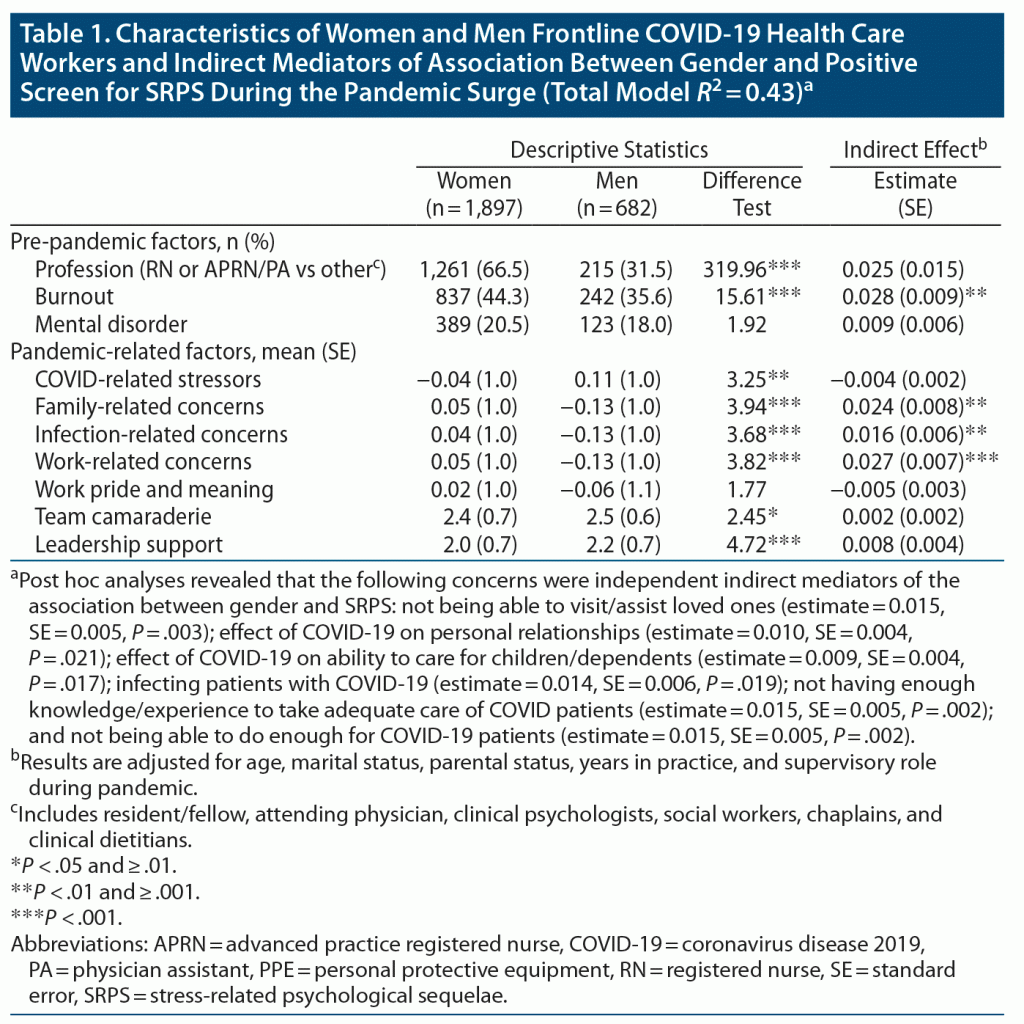
J Clin Psychiatry 2022;83(1):21br14098
To cite: Lowe SR, Hennein R, Feingold JH, et al. Are women less psychologically resilient than men? background stressors underlying gender differences in reports of stress-related psychological sequelae. J Clin Psychiatry. 2022;83(1):21br14098.
To share: https://doi.org/10.4088/JCP.21br14098
© Copyright 2021 Physicians Postgraduate Press, Inc.
aDepartment of Social and Behavioral Sciences, Yale School of Public Health, New Haven, Connecticut
bDepartment of Psychiatry, Yale School of Medicine, New Haven, Connecticut
cDepartment of Epidemiology of Microbial Diseases, Yale School of Public Health, New Haven, Connecticut
dYale School of Medicine, New Haven, Connecticut
eDepartment of Medical Education, Icahn School of Medicine at Mount Sinai, New York, New York
fDepartment of Medicine, Icahn School of Medicine at Mount Sinai, New York, New York
gOffice of Well-Being and Resilience, Icahn School of Medicine at Mount Sinai, New York, New York
hWomen’s Health Research at Yale, Yale School of Medicine, New Haven, Connecticut
iDepartment of Veterans Affairs, National Center for Posttraumatic Stress Disorder, VA Connecticut Healthcare System, West Haven, Connecticut
jDepartment of Psychiatry, Icahn School of Medicine at Mount Sinai, New York, New York
kDepartment of Environmental Medicine and Public Health, Icahn School of Medicine at Mount Sinai, New York, New York
*Corresponding author: Sarah R. Lowe, PhD, Department of Social and Behavioral Sciences, Yale School of Public Health, 60 College St, New Haven, CT 06510 ([email protected]).
Women are often reported to be more likely than men to develop stress-related psychological sequelae (SRPS), such as symptoms of major depressive disorder (MDD), generalized anxiety disorder (GAD), and posttraumatic stress disorder (PTSD), in response to an index stressor.1 While such trends may contribute to notions of women being “more vulnerable” and “less psychologically resilient” than men, prior work has rarely considered the role of co-occurring gender disparities in social position (eg, occupational status) and psychosocial responsibilities (eg, caretaking) that may shape gender differences in SRPS. The combination of such disparities and a traumatic event may result in women having an apparent heightened response to the index stressor relative to men and thus appearing less resilient.2 Although resilience is most commonly defined as a trajectory of stable mental health following a severe stressor,3 the present study examines the current level of SRPS in response to an ongoing index stressor and operationalizes resilience as having low SRPS.
In the current study, we examined how a broad range of gender disparities may account for gender differences in SRPS in a highly stressed population—frontline health care workers (FHCWs) directly responding to the COVID-19 pandemic.
Methods
A survey was emailed to a purposively selected sample of 6,026 FHCWs at Mount Sinai Hospital in New York City during the initial SARS-CoV-2 pandemic surge between April 14–May 11, 2020. Of those invited, 3,360 (55.8%) completed an anonymous survey. Participants were given response options of “female,” “male,” and “other identity.” Given that only 8 participants responded “other identity,” we were unable to meaningfully include these participants in the analyses. Of the remaining 3,352 participants, 2,579 (76.9%) reported providing direct care for patients with COVID-19 and were included in the analyses. Because the survey was introduced to participants as exploring socially constructed roles and variables, the current study elected to consider participant reports as gender identification and use the terms women and men rather than female and male.4 The local institutional review board approved the study, and American Association for Public Opinion Research Reporting Guidelines5 were employed.
Validated cutoff scores on the Patient Health Questionnaire-8,6 Generalized Anxiety Disorder-7,7 and a brief version of the PTSD Checklist for DSM-58 were used to screen for SRPS. Supplementary Table 1 describes all study measures.
Chi-square and independent-samples t tests compared women and men FHCWs for potential mediators in the relation between gender and probable SRPS. Path analysis then examined indirect mediators of the relationship between gender and probable SRPS.
Results
The sample consisted of relatively equal proportions of FHCWs aged < 35 years (54.6%) and ≥ 35 years (45.4%), and the majority were women (73.6%). The sample had a median 6.0 years of experience (interquartile range [IQR] = 8.0) and worked a median of 37.5 hours onsite during the pandemic surge (IQR = 10.3).
Women were more likely than men to screen positive for any SRPS (n = 802 [42.3%] vs n = 203 [29.8%], χ2 = 33.02, P < .001) and for all of the individual disorders that were screened: MDD (n = 553 [29.2%] vs n = 130 [19.1%]), GAD (n = 518 [27.4%] vs n = 124 [18.2%]), and PTSD (n = 467 [24.7%] vs n = 681 [19.4%]); all χ2 > 7.83, all P values < .006. Table 1 shows characteristics of FHCW women and men.
While identifying as a woman was associated with a significantly greater likelihood of SRPS (Wald χ2 = 33.82, P = 6.0 × 10−9; odds ratio = 1.73, 95% CI = 1.43–2.08), this direct effect of reported gender was nonsignificant after accounting for indirect effects of the presence of pre-pandemic burnout and family-, infection-, and work-related concerns during the pandemic (estimate = 0.038, SE = 0.038, P = .31; Table 1). Collectively, the indirect effect via these factors accounted for 77.1% of the total effect of gender in predicting probable SRPS.
Discussion
We found that gender differences in SRPS among FHCWs were explained by the presence of reported “background stressors” for women (most notably pre-pandemic burnout) as well as by the effects of the index stressor (eg, caring for children/dependents during the pandemic). These findings add to a limited body of predominantly theoretical literature calling for attention to contextual influences on gender differences in measuring stress and concepts of resilience.2 Findings also align with socio-ecological models of health, which have deep historical roots dating back to the aftermath of World War I and burgeoning in the 1980s9 but remain underutilized in the current stress, trauma, and resilience literature.
This study was limited by a cross-sectional design, which did not permit the usual longitudinal approach to assessing resilience or an examination of the trajectory of SRPS; use of screening instruments to assess mental health outcomes; use of sex indicators to assess gender identity; lack of insight into the experiences of gender non-binary FHCWs. Nevertheless, our findings underscore the importance of attending to gender disparities in the assessment of stress and resilience. Our results require replication examining the role of gender disparities in other stress-exposed populations and for other public health crises. The current findings are important in considering how gender disparities may affect the assessment of stress and resilience and for designing and evaluating prevention and treatment efforts that promote the mental health of FHCWs.
Published online: December 21, 2021.
Author contributions: Dr Pietrzak had full access to all the data in the study and takes responsibility for the integrity of the data and accuracy of the data analysis. Concept and design: Lowe, Hennein, Mazure, Pietrzak. Acquisition, analysis, or interpretation of data: All authors. Drafting of the manuscript: Lowe, Hennein, Mazure, Pietrzak. Critical revision of the manuscript for important intellectual content: All authors. Statistical analysis: Pietrzak.
Administrative, technical, or material support: Ripp, Mazure, Peccoralo. Supervision: Ripp, Mazure, Pietrzak.
Potential conflicts of interest: The authors have no disclosures to report.
Funding/support: This study was supported by internal funding devoted to COVID-19–related projects from the Icahn School of Medicine at Mount Sinai and the Wendy U. and Thomas C. Naratil Pioneer Award from Women’s Health Research at Yale (Drs Lowe and Pietrzak).
Role of the sponsor: The funders had no role in the design and conduct of the study; collection, management, analysis, and interpretation of the data; preparation, review, or approval of the manuscript; and decision to submit the manuscript for publication.
Acknowledgments: The authors thank all of the health care workers who participated in this study and the Mount Sinai COVID-19 Psychological Impact Study Team: Chi C. Chan, PhD; Carly A. Kaplan, BS; Halley Kaye-Kauderer, BA; Jaclyn Verity, MPH; Larissa Burka, RN; Adriana Feder, MD; Alicia Hurtado, MD; James W. Murrough, MD, PhD; Steven M. Southwick, MD; and Dennis Charney, MD.
Supplementary material: Available at Psychiatrist.com.
References (9)

- North CS. Disaster mental health epidemiology: methodological review and interpretation of research findings. Psychiatry. 2016;79(2):130–146. PubMed CrossRef
- Hirani S, Lasiuk G, Hegadoren K. The intersection of gender and resilience. J Psychiatr Ment Health Nurs. 2016;23(6–7):455–467. PubMed CrossRef
- Southwick SM, Bonanno GA, Masten AS, et al. Resilience definitions, theory, and challenges: interdisciplinary perspectives. Eur J Psychotraumatol. 2014;5(1):25338. PubMed CrossRef
- Office of Research on Women’s Health, National Institutes of Health. Sex & Gender. Accessed September 30, 2021. https://orwh.od.nih.gov/sex-gender
- Pitt SC, Schwartz TA, Chu D. AAPOR Reporting Guidelines for Survey Studies. JAMA Surg. 2021;156(8):785–786. PubMed CrossRef
- Shin C, Lee SH, Han KM, et al. Comparison of the usefulness of the PHQ-8 and PHQ-9 for screening for major depressive disorder: analysis of psychiatric outpatient data. Psychiatry Investig. 2019;16(4):300–305. PubMed CrossRef
- Spitzer RL, Kroenke K, Williams JB, et al. A brief measure for assessing generalized anxiety disorder: the GAD-7. Arch Intern Med. 2006;166(10):1092–1097. PubMed CrossRef
- Geier TJ, Hunt JC, Hanson JL, et al. Validation of abbreviated four- and eight-item versions of the PTSD Checklist for DSM-5 in a traumatically injured sample. J Trauma Stress. 2020;33(3):218–226. PubMed CrossRef
- McLaren L, Hawe P. Ecological perspectives in health research. J Epidemiol Community Health. 2005;59(1):6–14. PubMed CrossRef
This PDF is free for all visitors!






